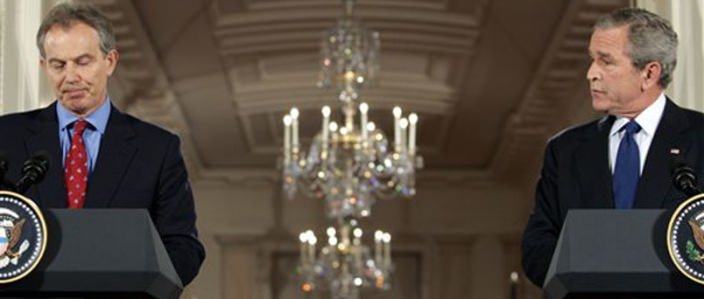 Politics
Politics
A Coalition of the Unwilling
Mar 7, 2007 While America is still begrudgingly coming to terms with the climate crisis, British politicians, scientists and newspapers have been shouting from the rooftops for years. So why is the U.S. so far behind its closest ally? Truthdig foreign correspondent Sarah Stillman spoke with more than 20 experts to find out. 1 2 3 4 5A Nation of "Once-lers": the Strand of Addiction
Let's begin with the most simple of explanations for the cross-Atlantic climate divide, one shared with me by global warming guru Bill McKibben: "Americans are deeper in denial because they're deeper in addiction." Best-selling author of "The End of Nature" and "Deep Economy," McKibben has an arsenal of cheerless facts to back him up. The U.S., with only 4.6 percent of the world's population, is now responsible for 23.5 percent of global emissions of carbon dioxide, the dominant greenhouse gas. "Per capita, we use twice the energy of Europeans," McKibben noted, conjuring an image of Joe Average driving home from Wal-Mart in his SUV, stocked with carbon-coughing gadgets and grocery bags full of perpetual summer (mangos from China, anyone?).
The Brits, meanwhile, ranked 38th in world carbon emissions per capita in 2003 -- a less-than-saintly stat, to be sure, but also one that reflects the UK's unique history of incentives to reduce coal dependency. David Demeritt, a climate change expert at King's College, London, pointed me to Britain's "dash for gas" in the 1990s as the origin of the country's kinder carbon status -- a period after the privatization of the electricity sector when coal-fired power stations were replaced by more efficient gas-fired plants. The key motive? Not former Prime Minister Margaret Thatcher's pursuit of good climate karma, but rather her attempts to break the National Union of Mineworkers and cut energy costs. Even so, the resultant carbon reductions helped the Brits meet their Kyoto commitments with relative ease, while inaugurating an ongoing national quest for cheap and renewable energy sources.
At the individual level, guilt-ridden UK carbon addicts tend to enjoy more accessible rehab options than their American counterparts. Want to start keeping track of your electricity consumption? British Gas customers can easily install a smart-metering device that allows them to monitor their electricity use in real time or track it on their computer screen. Want to calculate your eco-footprint? Grass-roots "CRAGS" -- carbon reduction action groups -- offer self-help sessions with volunteer "carbon accountants" as well as a variety of DIY tools. Want climate-friendly produce? Britain's extensive local food networks offer organic fruits and veggies while sparing you, for instance, the 127 calories of fossil energy it would take to transport a single calorie of iceberg lettuce from California to London. For those who'd rather not give up the mega-store shopping experience, Tesco -- the nation's largest supermarket chain -- will soon be labeling all 70,000 of its products with the amount of carbon generated from their production, transport and consumption.
But if Britain offers more opportunities for citizens to make ecologically informed choices, whether or not people actually do is another question altogether. As appetites for cheap flights, big cars and big-screen TVs prove increasingly insatiable, the UK-U.S. addiction differential to which Bill McKibben points grows smaller by the day -- and not because America is decreasing its carbon generation. Soon enough, Britain may be whistling to the tune of Dr. Seuss' The Once-ler, that infamous corporate grump from "The Lorax" who currently holds America under his thumb: "I meant no harm. I most truly did not. But I had to grow bigger. So bigger I got."
Next Page: States of (In)Action: The Strand of Political Leadership
You need to be a supporter to comment.
There are currently no responses to this article.
Be the first to respond.